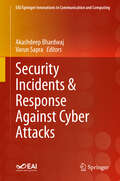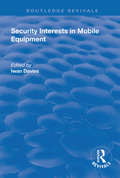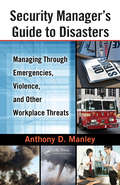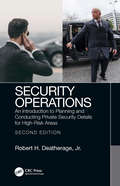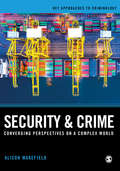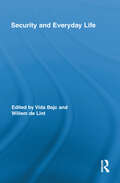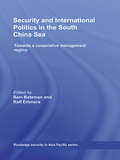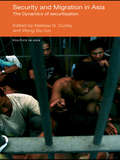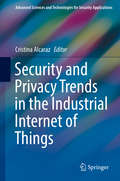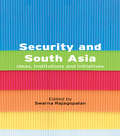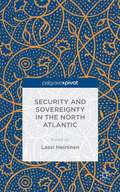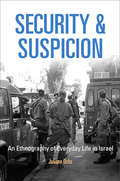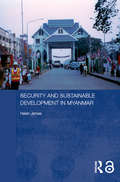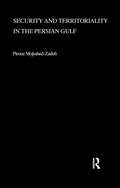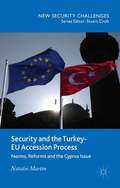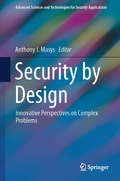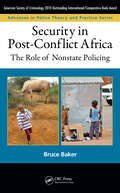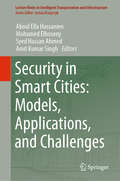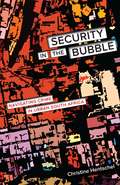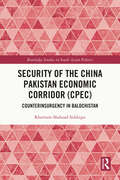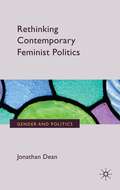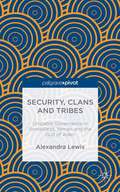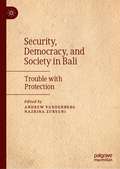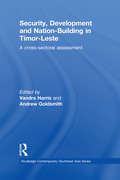- Table View
- List View
Security Incidents & Response Against Cyber Attacks (EAI/Springer Innovations in Communication and Computing)
by Akashdeep Bhardwaj Varun SapraThis book provides use case scenarios of machine learning, artificial intelligence, and real-time domains to supplement cyber security operations and proactively predict attacks and preempt cyber incidents. The authors discuss cybersecurity incident planning, starting from a draft response plan, to assigning responsibilities, to use of external experts, to equipping organization teams to address incidents, to preparing communication strategy and cyber insurance. They also discuss classifications and methods to detect cybersecurity incidents, how to organize the incident response team, how to conduct situational awareness, how to contain and eradicate incidents, and how to cleanup and recover. The book shares real-world experiences and knowledge from authors from academia and industry.
Security Interests in Mobile Equipment (Routledge Revivals)
by Iwan DaviesThis title was first published in 2002: This collection of essays marks the formal launch of the Centre for Instalment Credit Law at the University of Wales, Swansea. Divided into three sections, it examines the concept of security within domestic law; considers the choice of law rules; and ponders development of uniform law.
Security Manager's Guide to Disasters: Managing Through Emergencies, Violence, and Other Workplace Threats
by Anthony D. ManleyTerrorist or criminal attack, fire emergency, civil or geographic disruption, or major electrical failure recent years have witnessed an increase in the number of natural disasters and man-made events that have threatened the livelihoods of businesses and organizations worldwide. Security Manager‘s Guide to Disasters: Managing Through Emergencies,
Security Operations: An Introduction to Planning and Conducting Private Security Details for High-Risk Areas
by Robert H. Deatherage, Jr.Security Operations: An Introduction to Planning and Conducting Private Security Details for High-Risk Areas, Second Edition was written for one primary purpose: to keep people alive by introducing them to private security detail tactics and techniques. The book provides an understanding of the basic concepts and rules that need to be followed in protective services, including what comprises good security practice. This second edition is fully updated to include new case scenarios, threat vectors, and new ambush ploys and attack tactics used by opportunistic predators and seasoned threat actors with ever-advanced, sophisticated schemes. Security has always been a necessity for conducting business operations in both low- and high-risk situations, regardless of the threat level in the operating environment. Overseas, those with new ideas or businesses can frequently be targets for both political and criminal threat agents intent on doing harm. Even in the United States, people become targets because of positions held, publicity, politics, economics, or other issues that cause unwanted attention to a person, their family, or business operations. Security Operations, Second Edition provides an introduction to what duties a security detail should perform and how to effectively carry out those duties. The book can be used by a person traveling with a single bodyguard or someone being moved by a full security detail. FEATURES • Identifies what can pose a threat, how to recognize threats, and where threats are most likely to be encountered • Presents individuals and companies with the security and preparedness tools to protect themselves when operating in various environments, especially in high-risk regions • Provides an understanding of operational security when in transit: to vary route selection and keep destinations and movement plans out of the public view • Outlines the tools and techniques needed for people to become security conscious and situationally aware for their own safety and the safety of those close to them An equal help to those just entering the protection business or people and companies that are considering hiring a security detail, Security Operations is a thorough, detailed, and responsible approach to this serious and often high-risk field. Robert H. Deatherage Jr. is a veteran Special Forces Soldier and private security consultant with thirty years’ experience in military and private security operations. His various writings on security topics cover security operations, threat assessment, risk management, client relations, surveillance detection, counter surveillance operations, foot and vehicle movements, and building security—blending solid operational theory with practical field experience.
Security and Crime: Converging Perspectives on a Complex World (Key Approaches to Criminology)
by Alison WakefieldSecurity and Crime is an authoritative and multidisciplinary analysis of the relationship between security and crime, addressing much of the confusion about its nature and meaning, clarifying its relevance to criminological analysis, and giving due attention to the interdisciplinary nature of the topic. Providing an historical and prospective look at issues within security the book will: trace the development of ′security′ across disciplines situate this contested concept within criminological discourse and concerns explore the rising attention in politics and academic scholarship to ′security′ issues as they relate to crime examine the nature and organisation of interventions to deliver security establish clearly the relationship between security, crime and criminology. International in scope, and broad in coverage, Security and Crime sets out the need to broaden the study of security in a clear, concise style that is easy for students to digest. With comprehensive pedagogical feature including chapter overviews, key terms, study questions, further reading and a glossary, this book is essential for students studying security in criminology, criminal justice, international relations, and related disciplines.
Security and Crime: Converging Perspectives on a Complex World (Key Approaches to Criminology)
by Alison WakefieldSecurity and Crime is an authoritative and multidisciplinary analysis of the relationship between security and crime, addressing much of the confusion about its nature and meaning, clarifying its relevance to criminological analysis, and giving due attention to the interdisciplinary nature of the topic. Providing an historical and prospective look at issues within security the book will: trace the development of ′security′ across disciplines situate this contested concept within criminological discourse and concerns explore the rising attention in politics and academic scholarship to ′security′ issues as they relate to crime examine the nature and organisation of interventions to deliver security establish clearly the relationship between security, crime and criminology. International in scope, and broad in coverage, Security and Crime sets out the need to broaden the study of security in a clear, concise style that is easy for students to digest. With comprehensive pedagogical feature including chapter overviews, key terms, study questions, further reading and a glossary, this book is essential for students studying security in criminology, criminal justice, international relations, and related disciplines.
Security and Everyday Life (Routledge Advances in Criminology)
by Vida BajcWhen everyday social situations and cultural phenomena come to be associated with a threat to security, security becomes a value which competes with other values – particularly the right to privacy and human rights. In this comparison, security appears as an obvious choice over the loss of some aspects of other values and is seen as a reasonable and worthwhile sacrifice because of what security promises to deliver. When the value of security is elevated to the top of the collective priorities, it becomes a meta-frame, a reference point in relation to which other aspects of social life are articulated and organized. With the tendency to treat a variety of social issues as security threats and the public’s growing acceptance of surveillance as an inevitable form of social control, the security meta-frame rises to the level of a dominant organizing principle in such a way that it shapes the parameters and the conditions of daily living. This volume offers case studies from multiple countries that show how our private and public life is shaped by the security meta-frame and surveillance. It is essential reading for everyone who is interested in the changes to be faced in social life, privacy, and human freedoms during this age of security and surveillance.
Security and International Politics in the South China Sea: Towards a co-operative management regime (Routledge Security in Asia Pacific Series #Vol. 9)
by Ralf Emmers Sam BatemanThe South China Sea has long been regarded as a major source of tension and instability in East Asia. Managing the risk of possible conflict over disputed claims in the South China Sea has been a significant challenge for regional relations. This book explores international politics and security in the South China Sea. It outlines the history of the South China Sea disputes, and the efforts that have been made to resolve these, assessing the broader strategic significance of the region for major geopolitical powers. In addition, new challenges have emerged of resource management, environmental protection, and most recently, of the security and safety of shipping against the threats of piracy and maritime terrorism. The book discusses the convergence of traditional and non-traditional security issues now appearing to provide a basis for co-operation in the South China Sea. It shows how the challenge of establishing co-operative relations is now being met, largely through agreement between the Association of Southeast Asian Nations (ASEAN) and China in 2002 on the Declaration on the Conduct of Parties in the South China Sea, and a range of recent measures for functional co-operation.
Security and Migration in Asia: The Dynamics of Securitisation (Politics in Asia)
by Wong Siu-Lun Melissa CurleySecurity and Migration in Asia explores how various forms of unregulated and illegal forms of human movement within Asia and beyond the region have come to be treated as 'security' issues, and whether and how a 'securitization' framework enables a more effective response to them. The process and theory of 'securitization' and 'desecuritization' have been developed within the international relations literature by the so-call Copenhagen school scholars, including Barry Buzan and Ole Waever among others. The topics explored in this well- presented and engaging book cover geographic areas of China, Northeast Asia, Central Asia, the Russian Far East, Southeast Asia, and the Hong Kong SAR, and includes research on: human trafficking and people smuggling financing illegal migration and links to transnational organized crime regulated and unregulated labour migration the 'securitization' of illegal migration in sending, transit and receiving countries. This book provides compelling insights into contemporary forms of illegal migration, under conditions of globalization, and makes a contribution to the literature in international relations and migration studies.
Security and Privacy Trends in the Industrial Internet of Things (Advanced Sciences and Technologies for Security Applications)
by Cristina AlcarazThis book, written by leaders in the protection field of critical infrastructures, provides an extended overview of the technological and operative advantages together with the security problems and challenges of the new paradigm of the Internet of Things in today’s industry, also known as the Industry Internet of Things (IIoT). The incorporation of the new embedded technologies and the interconnected networking advances in the automation and monitoring processes, certainly multiplies the functional complexities of the underlying control system, whilst increasing security and privacy risks. The critical nature of the application context and its relevance for the well-being of citizens and their economy, attracts the attention of multiple, advanced attackers, with stealthy abilities to evade security policies, ex-filter information or exploit vulnerabilities. Some real-life events and registers in CERTs have already clearly demonstrated how the control industry can become vulnerable to multiple types of advanced threats whose focus consists in hitting the safety and security of the control processes. This book, therefore, comprises a detailed spectrum of research papers with highly analytical content and actuation procedures to cover the relevant security and privacy issues such as data protection, awareness, response and resilience, all of them working at optimal times. Readers will be able to comprehend the construction problems of the fourth industrial revolution and are introduced to effective, lightweight protection solutions which can be integrated as part of the new IIoT-based monitoring ecosystem.
Security and South Asia: Ideas, Institutions and Initiatives
by Swarna RajagopalanStephen Philip Cohen can rightly be called the doyen of South Asian security analysis, especially traditional security concerns in the region and advocacy on US foreign policy. The contributors to the volume have all, at different at different points in time, been Cohen’s students, and are now well-known scholars in their own right. Broadly dividing Cohen’s work into categories, the contributors deal with the following issues: how security is understood and how important strategic relationships are framed approaches to and choices made in the areas of military structure, arms production, and investment in science and technology how and why civil society groups are mobilized towards political ends—specifically looking at ethnic mobilization in diaspora communities, non-official initiatives for peace in South Asia, and the role of state and non-state actors in disaster management the role of the army. The essays reflect a view of security as something people choose to make for themselves through an exercise of agency that is rooted in the realm of ideas.
Security and Sovereignty in the North Atlantic
by Lassi HeininenThe North Atlantic continues to be an area of international strategic significance regionally and globally. This study explores the strong processes of sovereignty, as well as new independent states and micro-proto-states that are forming in the region.
Security and Suspicion: An Ethnography of Everyday Life in Israel (The Ethnography of Political Violence)
by Juliana OchsIn Israel, gates, fences, and walls encircle public spaces while guards scrutinize, inspect, and interrogate. With a population constantly aware of the possibility of suicide bombings, Israel is defined by its culture of security. Security and Suspicion is a closely drawn ethnographic study of the way Israeli Jews experience security in their everyday lives.Observing security concerns through an anthropological lens, Juliana Ochs investigates the relationship between perceptions of danger and the political strategies of the state. Ochs argues that everyday security practices create exceptional states of civilian alertness that perpetuate—rather than mitigate—national fear and ongoing violence. In Israeli cities, customers entering gated urban cafés open their handbags for armed security guards and parents circumnavigate feared neighborhoods to deliver their children safely to school. Suspicious objects appear to be everywhere, as Israelis internalize the state's vigilance for signs of potential suicide bombers. Fear and suspicion not only permeate political rhetoric, writes Ochs, but also condition how people see, the way they move, and the way they relate to Palestinians. Ochs reveals that in Israel everyday practices of security—in the home, on commutes to work, or in cafés and restaurants—are as much a part of conflict as soldiers and military checkpoints.Based on intensive fieldwork in Israel during the second intifada, Security and Suspicion charts a new approach to issues of security while contributing to our appreciation of the subtle dynamics of the Israeli-Palestinian conflict. This book offers a way to understand why security propagates the very fears and suspicions it is supposed to reduce.
Security and Sustainable Development in Myanmar (Routledge Contemporary Southeast Asia Series #Vol. 11)
by Helen JamesHelen James considers security in Myanmar/Burma. She uses the ideas put forward in the United Nations Development Programme's 1994 report, of human, as opposed to state and security, going on to argue that freedom from want, and freedom from fear (of the regime) are in fact mutually supportive ideas, and that the security of the people and the security of the state are in fact in a symbiotic relationship with each other. Presenting new and significant information of the security concept of Myanmar/Burma, James’ original work considers economic development, health, education, environmental issues, the drugs trade, human rights, minority peoples and political, social and economic reforms, arguing that improved governance, the development of civil society and economic development would both strengthen the state and ensure the security and well-being of its citizens.
Security and Territoriality in the Persian Gulf: A Maritime Political Geography
by Pirouz Mojtahed-Zadeh Dr Pirouz Mojtahed-ZadehThis study presents the story of successes and failures of the treatment of security matters pertaining to territorial and boundary affairs in the maritime areas of the Persian Gulf, and at the same time provides an example of the impact of territoriality on world-wide maritime security.
Security and the Turkey�EU Accession Process
by Natalie MartinThis timely study looks at the various phases of the Turkey-European Union accession process, which began in 1959, and the implications for security. Martin explains the origins of this process, when Turkey was once considered eligible for 'European' or 'Western' status because of the Cold War context, and goes on to explore why its progress has been so impeded. Once Turkey's eligibility had been established, it was difficult for the EU to backtrack, especially in the light of the Cold Wargeostrategic imperative. Instead, opposition to the Turkish case, which was largely religious or cultural, was couched in normative terms. For as long as Turkey continued to have a poor record of human rights and democracy, the opportunities for its opponents to block the accession progress were plentiful. Between 1999 and 2004, Turkey's sustained effort to improve upon its human rights record resulted in gains in the accession process. Since 2005, however, the situation has returned to deadlock as Turkey's normative progress has ground to a halt amid resurgent opposition within the European Union and increasing authoritarianism in Turkey. This book argues that the Arab Spring and its consequences have, ironically, offered a renewed opportunity for the EU to renew accession and demand conditionality from Ankara. However, it is an opportunity which cannot be taken amid the increasingly illiberal nature of the Turkish government, which runs counter to the high ideals of Brussels. Martin contends that the European Union has missed a vital chance to secure Turkey as a liberal democracy in a volatile part of the world. As Turkey's future relations with the European Union hang in the balance, Martin's inter-disciplinary study will be of significant interest to students and practitioners alike.
Security by Design: Innovative Perspectives on Complex Problems (Advanced Sciences and Technologies for Security Applications)
by Anthony J. MasysThis edited book captures salient global security challenges and presents ‘design’ solutions in dealing with wicked problems. Through case studies and applied research this book reveals the many perspectives, tools and approaches to support security design. Security design thereby can support risk and threat analysis, risk communication, problem framing and development of interventions strategies. From the refugee crisis to economic slowdowns in emerging markets, from ever-rising numbers of terrorist and cyberattacks to global water shortages, to the proliferation of the Internet of Things and its impact on the security of our homes, cities and critical infrastructure, the current security landscape is diverse and complex. These global risks have been in the headlines in the last year (Global Risks Report) and pose significant security challenges both nationally and globally. In fact, national security is no longer just national. Non-state actors, cyber NGO, rising powers, and hybrid wars and crimes in strategic areas pose complex challenges to global security. In the words of Horst Rittel (1968):"Design is an activity, which aims at the production of a plan, which plan -if implemented- is intended to bring about a situation with specific desired characteristics without creating unforeseen and undesired side and after effects."
Security in Post-Conflict Africa: The Role of Nonstate Policing (Advances in Police Theory and Practice)
by Bruce BakerPolicing is undergoing rapid change in Africa as a result of democratization, the commercialization of security, conflicts that disrupt policing services, and peace negotiations among former adversaries. These factors combined with the inability of Africa‘s state police to provide adequate protection have resulted in the continuing popularity of va
Security in Smart Cities: Models, Applications, and Challenges (Lecture Notes in Intelligent Transportation and Infrastructure)
by Syed Hassan Ahmed Aboul Ella Hassanien Amit Kumar Singh Mohamed ElhosenyThis book offers an essential guide to IoT Security, Smart Cities, IoT Applications, etc. In addition, it presents a structured introduction to the subject of destination marketing and an exhaustive review on the challenges of information security in smart and intelligent applications, especially for IoT and big data contexts. Highlighting the latest research on security in smart cities, it addresses essential models, applications, and challenges.Written in plain and straightforward language, the book offers a self-contained resource for readers with no prior background in the field. Primarily intended for students in Information Security and IoT applications (including smart cities systems and data heterogeneity), it will also greatly benefit academic researchers, IT professionals, policymakers and legislators. It is well suited as a reference book for both undergraduate and graduate courses on information security approaches, the Internet of Things, and real-world intelligent applications.
Security in the Bubble: Navigating Crime in Urban South Africa (Globalization and Community #24)
by Christine HentschelFocusing on the South African city of Durban, Security in the Bubble looks at spatialized security practices, engaging with strategies and dilemmas of urban security governance in cities around the world. While apartheid was spatial governance at its most brutal, postapartheid South African cities have tried to reinvent space, using it as a &“positive&” technique of governance.Christine Hentschel traces the contours of two emerging urban regimes of governing security in contemporary Durban: handsome space and instant space. Handsome space is about aesthetic and affective communication as means to making places safe. Instant space, on the other hand, addresses the crime-related personal &“navigation&” systems employed by urban residents whenever they circulate through the city. While handsome space embraces the powers of attraction, instant space operates through the powers of fleeing. In both regimes, security is conceived not as a public good but as a situational experience that can.No longer reducible to the after-pains of racial apartheid, this city&’s fragmentation is now better conceptualized, according to Hentschel, as a heterogeneous ensemble of bubbles of imagined safety.
Security of the China Pakistan Economic Corridor: Counterinsurgency in Balochistan (Routledge Studies in South Asian Politics)
by Khurram Shahzad SiddiquiThis book analyses the strategic and economic significance of the China-Pakistan Economic Corridor (CPEC), with a particular focus on the region of Balochistan. Given the history of multiple insurgencies that the Pakistani Military has confronted in Balochistan, the book examines the region's intricate conflict ecosystem and security landscape, which poses potential threats to the CPEC. Structured chronologically, the book traces the evolution of the Pakistani Army's counterinsurgency practices inherited in 1947 from the British Indian Army's culture of fighting small wars through to the contemporary counterinsurgency (COIN) adaptation in the ‘war on terror’, and afterwards, to the fifth round of the Balochistan insurgency. The analysis centres on the development of counterinsurgency theory and practice by the Pakistani Army. It empirically investigates the efficacy of the COIN strategy in Balochistan. The author argues that the approach significantly changed after conceptualising the doctrine, especially from 2016 onwards, from ‘butcher and bolt’ to the inclusion of critical components like political primacy, affect-based and focused use of force, ‘winning hearts and minds’ and rules of engagement. As a result, there was reduced violence and an increased number of insurgent surrenders. The book concludes that the Pakistani Army has largely controlled the insurgency in Balochistan. However, simultaneously, there is an urgent need to reduce tangible support to the insurgents through porous borders and implement an effective strategy to sever the nexus between the Islamic State of Khorasan (ISKP) and the Baloch insurgent organisations, as well as the sectarian militant organisations in Balochistan province. This is crucial to ending the insurgency and ensuring the security of CPEC. A novel contribution to the study of counterinsurgency and the importance of CPEC to China’s foreign policy and diplomacy, as well as its effects on the conflict dynamics in Balochistan, the book will be of interest to researchers studying War and Conflict Studies, Terrorism Studies, International Relations, Security and Strategic Studies, and South Asian and Chinese Studies.
Security, Citizenship and Human Rights
by Derek McgheeRethinking Contemporary Feminist Politics puts forward a timely analysis of contemporary feminism. Critically engaging with both narratives of feminist decline and re-emergence, it draws on poststructuralist political theory to assess current forms of activism in the UK and present a provocative account of recent developments in feminist politics.
Security, Clans and Tribes: Unstable Governance in Somaliland, Yemen and the Gulf of Aden
by Alexandra LewisOffering an introduction to clanism and tribalism in the Gulf of Aden area, Dr Lewis uses these concepts to analyse security in Yemen, Somalia, Somaliland and the broader region. This historical overview of conflict in each country, and the resulting threats of piracy and terrorism, will benefit both the casual reader and student of development.
Security, Democracy, and Society in Bali: Trouble with Protection
by Andrew Vandenberg Nazrina ZuryaniThis book focuses on how diverse developments are reflected in the rise of the security groups in Bali, Indonesia. Bali’s security groups pose many interesting questions. Why did they put up so many huge posters around the streets of southern Bali promoting themselves? Are their claims to represent the community plausible or are they “gangs”? How are they shaped by Indonesia’s violent past? How does Hinduism affect their gender politics? Do they promote illiberal populism or ethnic and religious tolerance? Does their central role in money politics prevent local democratization?Rather than write bottom-up history or bring the state back in, this collection as a whole draws on the ideas that circulate among leaders. These circulating ideas construct contemporary politics around both reinterpretations of old practices and responses to problems around tourism, gender, populism, religion, and democracy.
Security, Development and Nation-Building in Timor-Leste: A Cross-sectoral Assessment (Routledge Contemporary Southeast Asia Series)
by Andrew Goldsmith Vandra HarrisDespite Timor-Leste’s high expectations when it became independent from Indonesia in 2002, the country is ranked among the least developed countries in the world. It has found itself at the centre of international attention in the last decade, with one of the biggest interventions in UN history, as well as receiving amongst the highest per capita rates of bilateral assistance in the Asia-Pacific region. This book draws together the perspectives of practitioners, policy-makers and academics on the international efforts to rebuild one of the world’s newest nations. The contributors consider issues of peace-building, security and justice sector reform as well as human security in Timor-Leste, locating these in the broader context of building nation, stability and development. The book includes two demographic studies that can be used to critically examine the nation’s possible future. Engaging in deliberate consideration of both practical and theoretical complexities of international interventions, this book will be of interest to academics and students in the fields of Development, Security and Southeast Asian Studies.
